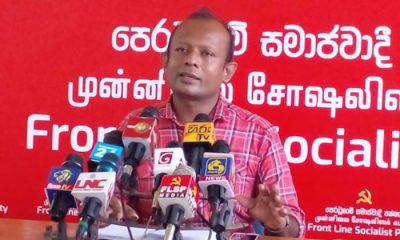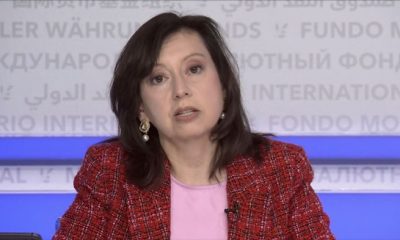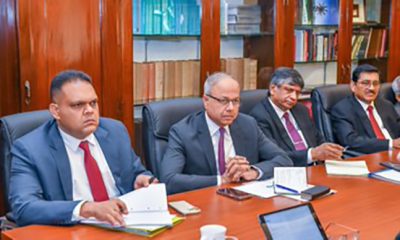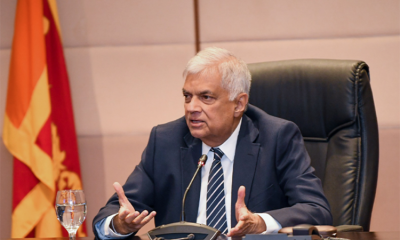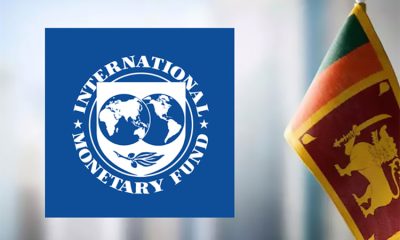News
Ex-AG backs IMF bailout conditions
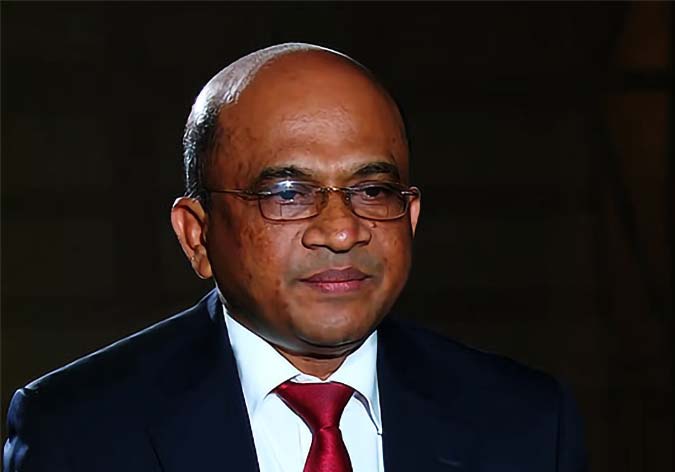
reminds how Yahapalanaya diluted National Audit Bill to appease corrupt lot
By Shamindra Ferdinando
Former Auditor General Gamini Wijesinghe yesterday (06) said that the weakening of the National Audit Bill, before Parliament endorsed the new law in early July 2018, too, had contributed to the collapse of the national economy. Alleging that the then Sirisena-Wickremesinghe coalition and influential public servants sabotaged their efforts to introduce a new law that could have been effectively used against corruption at all levels, Wijesinghe pointed out that the recently issued IMF’s Governance Diagnostic Assessment report on Sri Lanka demanded that the National Audit Act should be amended.
Although the Act provided for the powers, duties and functions of the Audit Service Commission and the establishment of the National Audit Office and the Sri Lanka State Audit Service and specified the role of the Auditor General over public finance, the then government ensured it lacked key provisions to deal with public sector waste, corruption, irregularities and mismanagement, Wijesinghe said.The IMF’s 16-point preconditions for the resumption and continuation of USD 2.9 bn bailout package exposed our entirely corrupt political party and public administration system, the retired Auditor General said. Those in Opposition couldn’t exploit the IMF’s demands for their advantage because they, too, were responsible for ruination of the national economy.
Wijesinghe said so responding to SJB lawmaker Dr. Harsha de Silva’s declaration that the failure on the part of the government to address deep-rooted corruption hampered financial recovery. Wijesinghe, who served as the AG from Nov. 2015 to April 2019, emphasized that economist Harsha represented the UNP at the time that party sabotaged the National Audit Bill. “What was finally enacted by the UNP and SLFP combine didn’t address primary concerns,” the outspoken official said, adding that the original Bill was meant to rein in top public sector management responsible for massive corruption.
Responding to another query, Wijesinghe said that the enactment of the new National Audit Bill was a key pledge made by the UNP-led coalition that backed Maithripala Sirisena at the 2015 January presidential election. Actually, it was to be introduced on 19 Feb., 2015, at the commencement of their 100-day Yahapalana programme, the present day civil society activist said, adding that the UNP and those who now represented the main Opposition SJB and the then divided UPFA worked against their effort.
Wijesinghe alleged that major political parties feared offending the public service. According to Wijesinghe, political parties pursued strategies in collaboration with the top management of the public administration for their benefit. “The position taken by the IMF should be appreciated and supported though the country was humiliated”, but such external pressure from lending bodies and bilateral donors were required to compel the parliament to take remedial measures the ex-AG said.
Declaring whatever the lame excuse trotted out by the government the IMF had suspended the second tranche amounting to USD 330 mn pending fresh staff-level agreement with Sri Lanka, Wijesinghe said that regardless the country being in such a precarious situation, the Parliament continued to turn a blind eye. “Allegations traded by government and Opposition members do not serve any purpose.
Whatever happens they are still committed to continue with the same system,” Wijesinghe said, pointing out that no political leader had the courage to tackle corruption. Referring to Treasury bond scams that had been perpetrated in Feb. 2015 and March 2016, the former Auditor General said that the Parliament’s response proved the public couldn’t depend on the legislature. Wijesinghe said that Sri Lanka should have acted two decades ago when corruption emerged as a major threat to political, economic and social stability.
The IMF’s demands (1) Establishment of an Advisory Committee by November 2023 to nominate commissioners for the Commission to Investigate Allegations of Bribery or Corruption (CIABOC), (2) Disclosure of asset declarations of senior officials by July 2024, (3) Enactment of proceeds of crime legislation by April 2024, (4) Amendment of the National Audit Act, (5) Finalization of implementation of regulations for beneficial ownership information and creating a public registry by April 2024, (6) Enactment of Public Procurement Law by December 2024, (7) Publishing reports on increasing competitive tendered procurement contracts, targeting agencies with low levels of competition, (8) Requiring the publication of all public procurement contracts above LKRs 1 billion, (9) Implementing the State-Owned Enterprise Reform Policy to ensure ethical management, (10) Abolishing or suspending the Strategic Development Projects Office Act until a transparent process for evaluating proposals is established, (11) Amending tax legislation to prevent unilateral tax changes without parliamentary approval, (12) Implementing short-term anti-corruption measures within revenue departments to enhance oversight and sanctions, (13) Exploring options for new management arrangements for the Employees Provident Fund to avoid conflicts of interest, (14) Revising legislation, regulations, and processes for stronger oversight in the banking sector, (15) Establishing an online digital land registry and ensuring progress in registering/titling-state land and (16) Expanding the resources and skills available to the Judicial Services Commission to strengthen justice.
News
US sports envoys to Lanka to champion youth development

The U.S. Embassy in Colombo welcomed the U.S. Sports Envoys to Sri Lanka, former National Basketball Association (NBA) and Women’s National Basketball Association (WNBA) players Stephen Howard and Astou Ndiaye, from June 8 through 14.
The Public Diplomacy section of the U.S. Embassy said that it would launch a weeklong basketball program intended to harness the unifying power of sports, made possible through collaboration with Foundation of Goodness and IImpact Hoop Lab.
While in Sri Lanka, Howard and Ndiaye, both retired professional basketball players, will conduct a weeklong program, Hoops for Hope: Bridging Borders through Basketball. The Sports Envoys will lead basketball clinics and exhibition matches and engage in leadership sessions in Colombo and Southern Province for youth aged 14-18 from Northern, Uva, Eastern and Western Provinces, offering skills and leadership training both on and off the court. The U.S. Envoys will also share their expertise with the Sri Lanka Basketball Federation, national coaches, and players, furthering the development of basketball in the country. Beyond the clinics, they will collaborate with Sri Lankan schoolchildren to take part in a community service project in the Colombo area.
“We are so proud to welcome Stephen and Astou as our Sports Envoys to Sri Lanka, to build on the strong people-to-people connections between the United States and Sri Lanka,” said U.S. Ambassador Julie Chung. “The lessons that will be shared by our Sports Envoys – communication, teamwork, resilience, inclusion, and conflict resolution – are essential for leadership development, community building, equality, and peace. The U.S. Sports Envoy program is a testament to our belief that sports can be a powerful tool in promoting peace and unity.”
News
Rahuman questions sudden cancellation of leave of CEB employees

SJB Colombo District MP Mujibur Rahuman in parliament demanded to know from the government the reasons for CEB suspending the leave of all its employees until further notice from Thursday.
MP Rahuman said that the CEB has got an acting General Manager anew and the latter yesterday morning issued a circular suspending leave of all CEB employees with immediate effect until further notice.
“We demand that Minister Kanchana Wijesekera should explain this to the House. This circular was issued while this debate on the new Electricity Amendment Bill was pending. There are many who oppose this Bill. The Minister must tell parliament the reason for the urge to cancel the leave of CEB employees,” the MP said.However, Speaker Mahinda Yapa Abeywardena prevented Minister Wijesekera responding to the query and said that the matter raised by MP Rahuman was not relevant.
News
CIPM successfully concludes 8th Annual Symposium

The Chartered Institute of Personnel Management (CIPM) successfully concluded the 8th Annual CIPM Symposium, which took place on 31st May 2024. Themed “Nurturing the Human Element—Redefining HRM in a Rapidly Changing World,” the symposium underscored the pivotal role of human resource management (HRM) in today’s dynamic global landscape. Since its inception in 1959, CIPM has been dedicated to advancing the HR profession through education, professional development, and advocacy, solidifying its position as Sri Lanka’s leading professional body for HRM.
Ken Vijayakumar, the President of the CIPM, graced the occasion as the chief guest. The symposium commenced with the welcome address by the Chairperson, Prof. Arosha Adikaram, followed by the Web Launch of the Symposium Proceedings and Abstract Book by the CIPM President. The event featured distinguished addresses, including a speech by Chief Guest Ken Vijayakumar, President of CIPM, and an address by Guest of Honor Shakthi Ranatunga, Chief Operating Officer of MAS Holdings Pvt. Ltd., Sri Lanka.
The symposium also featured an inspiring keynote address by Prof. Mario Fernando, Professor of Management and Director of the Centre for Cross Cultural Management (CCCM) at the University of Wollongong, Australia.
Vote of Thanks of the inauguration session was delivered by Dr. Dillanjani Weeratunga, Symposium Co-chair.
The symposium served as a comprehensive platform for researchers to present their findings across a wide range of critical topics in HRM. These included Cultural Diversity and Inclusion, Talent Development and Retention, Ethical Leadership and Corporate Social Responsibility, Adapting to Technological Advancements, Mental Health and Well-being at Work, Global Workforce Challenges, Employee Empowerment, and Reskilling and Upskilling.
The plenary session was led by Prof. Wasantha Rajapakse. Certificates were awarded to the best paper presenters during the valedictory session, followed by a vote of thanks delivered by Kamani Perera, Manager of Research and Development.
The annual symposium of CIPM was a truly inclusive event, attracting a diverse audience that spanned undergraduates, graduates, working professionals, research scholars and lecturers. This widespread interest highlights the symposium’s significance in the field of HRM, offering a unique opportunity for everyone to network and learn from scholarly brains.The CIPM International Research Symposium was sponsored by Hambantota International Port, Sri Lanka Institute of Information Technology (SLIIT), E B Creasy & Co. PLC, and Print Xcel Company.


